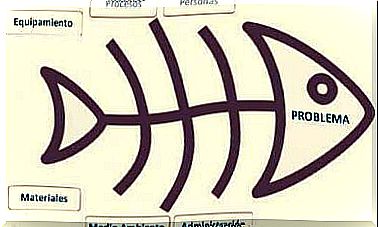Personality Psychology: Is There Even A Personality?

Regardless of which school you choose, if you are going to study psychology, the chances are high that you will take a course in personality psychology. Studying whether there is something that can be called a personality and what this would be about sounds understandable as a very interesting topic. However, we dare say that it is not something that is easy to get acquainted with.
We can easily say that this is a complicated area. In fact, there are many different models with similar updates, revisions, and associated reviews that you will need to learn. It is as if you were studying chemistry and there were several different periodic systems. It is at that level of complicated mess.
The real paradox: is there really a personality?
However, there is another mess that goes beyond all the models and definitions involved. It is impossible to overlook. We’re talking about whether personality exists at all. Believe it or not, the question of whether there really is a personality is something that fills many people’s heads. Think for a moment. Can we really say that someone is kind with the same certainty as we can say that someone is tall or short?
Eysenck or McCrae and Costa would probably say yes. These individuals have created the most well-known and well-known periodic systems of the personality. In fact, when it’s time to study personality psychology, you’ll see their names everywhere in your books and study guides. Proponents of factor analysis, key components and other techniques for information synthesis through statistical processes would also agree.
However, we are sure that you probably know someone who is outgoing in one context and introverted in another. Sometimes it is not even necessary to change the context. As a rule, people can swing in this dimension even within the same social encounter.
As you can understand, it is difficult to talk about personality and whether there is a personality at all, and it can be a little confusing. Wouldn’t it be much easier to be able to categorize people as we do with things? Everyone would then be much more predictable. Unfortunately, that possibility is quite unlikely given each person’s individuality.

Is there anything that can be called personality?
What if our belief in personality traits was a fantasy, just like with Santa Claus? After all, most people are really not consistent from one situation to another. This possibility shook the foundations of personality psychology in the late 1960s when Walter Mischel published a book entitled Personality and Assessment .
What then did this psychologist suggest? Yes, maybe he considered the possibility, but he did not commit to it. At least not in the way that Cain killed Abel, or Nietzsche beheaded God. In this case, Mischel chose a context-sensitive personality assessment .
This author stated that people themselves are not honest, but that it is possible to identify their tendency to be honest in certain specific circumstances. Let’s look at an example. Karl-Johan can be honest when he does not gain anything from lying, but does this make him an honest person? With this information, what is there to say about his honesty in cases where there is no merit in lying?
If we expand this idea, Karl-Johan may not be honest when it comes to protecting his loved ones, but he can be if he gets a lot of money for being that. Karl-Johan represents a whole world. Every single person is a whole universe.
Let’s go back to Mischel. According to him, there are five variables that a person’s behavior is sensitive to:
- Competencies. At each individual level: physical, intellectual, social, etc.
- Cognitive strategies. Management strategies and the individual’s experiences of them.
- Expectations. The consequences that a person expects for each option considered.
- The scale of personal values and self-concept. The measures that are in line with the person’s rating scale are certainly more likely.
- Self-regulating system. It refers to the set of rules and norms that people adapt to in order to regulate their behavior.
Final reflection
So when someone talks about the difficulty of studying what other people’s traits can entail, they do not understand that psychology is the most complicated study: that of man himself. This explains the difference between general knowledge and scientific knowledge. The latter is aware of or usually aware of the difficulty of its purpose.
Even today, personality psychology receives much criticism, especially its theories of personality traits.

For example, if we were to put Pelle in a hundred situations that tested his honesty, we could get a percentage of the times he was honest and assign him a number for the trait. He is 65% honest.
Can it now be possible to predict Pelle’s behavior in a specific situation based on this information alone? Someone might pay Pelle a pile of money for him to lie about something. However, Pelle can reject the offer and choose to be honest because he does not think that money is more important than being sincere.
The problem is that we actually have very limited information about the people we meet. For example, we can know the balance in their bank account, but not their brother, who needs money.
In addition, it is safe to say that personality psychology is to a large extent difficult to apply when one wants to transcend the theoretical models and apply them in reality.
The development may show the results
We can probably say with certainty that the models we mention in the introduction look good in a Powerpoint presentation. But there are still very many surrounding problems problems with them. At present, the theory seems exhausted; it has survived mostly due to the emergence of positive psychology.
Sooner or later, the information collected will be able to start guiding us towards a solution. In this situation, paradigms, such as IRT (item-response theory ), can become the rope that helps us get out of the well. We are aware that this article on personality psychology is something serious and difficult to digest. For that reason, let’s end it in a lighter tone. Here is a song that might fit:









